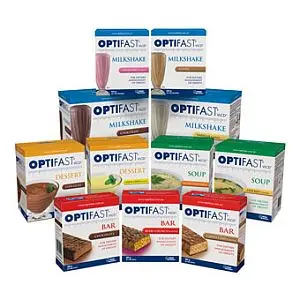Why Follow a Pre-Op Diet?
Before your weight loss surgery, we recommend a Very Low Calorie Diet (VLCD) such as Optifast for 1 to 3 weeks. This diet helps shrink the liver and reduce internal fat, making gastric sleeve or gastric bypass surgery safer and more technically straightforward.

Step 1: Watch the Dietitian Pre-Op Class
You must watch our pre-operative dietitian class before your surgery.
Click here to watch the Pre-Op Diet Class
What Is the Optifast VLCD?
Optifast is a medically formulated meal replacement program that provides controlled amounts of protein, minimal carbohydrates, essential fats, and complete vitamins and minerals.
Optifast helps switch the body from burning carbs to burning fat — especially the fat surrounding the liver. This makes surgery technically easier for your surgeon.
Allowed vs Not Allowed Foods
Allowed Foods
- Low-starch vegetables: alfalfa sprouts, asparagus, bean sprouts, bok choy, broccoli, brussels sprouts, cabbage, capsicum, carrots, cauliflower, celery, cucumber, eggplant, green beans, konjac noodles, lettuce, leeks, mushrooms, onions, radish, shallots, silver beet, snow peas, spinach, squash, tomatoes, watercress, zucchini
- Soups: stock cubes, Bonox (in moderation), vegetable soups made from allowed vegetables, miso soup
- Sauces & condiments: lemon & lime juice, vinegar, Worcestershire sauce, Tabasco sauce, soy sauce (in moderation), chilli, diet/fat-free salad dressings, mustard, tomato paste
- Herbs & spices: all spice, basil, celery flakes, chilli, chives, cinnamon, cloves, coriander, cumin, curry powder, dill, fennel, garlic, ginger, lite salt, mint, mustard seed, nutmeg, oregano, paprika, parsley, pepper, rosemary, sage, thyme, turmeric, tarragon
- Miscellaneous: artificial sweeteners, sugar-free lollies & gum, diet jelly, flavour essences, diet toppings
- Low-energy drinks: water, soda water, diet soft drinks & cordial, plain mineral water, tea & coffee (30 mL skim milk, no sugar), herbal teas
- Fruits in limited quantities: up to 5 strawberries, 1 passionfruit, or 1 lime per day
Not Allowed Foods
- Corn, green peas, legumes, lentils, potato, sweet potato, parsnip, pumpkin, turnip
- All soups not based on allowed vegetables
- Cream, high-calorie simmer sauces and salad dressings
- Fruit juice, alcohol, regular soft drinks, cordial (with sugar)
- Dairy products: milk, cheese, yoghurt, cream, ice cream
- Biscuits, cakes, crackers, lollies, desserts (unless sugar-free)
- All fruits not listed in the limited allowance
Daily Guidelines for the Optifast Diet
- ✅ 3 Optifast products (any combination of shakes, bars, soups, or desserts)
- ✅ 2 to 6 cups of low-starch vegetables
- ✅ 1 serve of lean protein (e.g. 80 g cooked meat or tofu)
- ✅ 1–2 teaspoons of olive oil
- ✅ 3 litres of total fluid intake (including water, tea, shakes, etc.)
Note: The water used to make shakes or soups does not count toward your daily 2 litres of extra water.
Common Side Effects and How to Manage Them
- Fatigue, hunger, headache → Stay well hydrated with at least 2 litres of water
- Constipation → Add Benefiber to shakes
- Bad breath (halitosis) → Sugar-free gum or mints can help
- Lactose intolerance → Use Lacteeze drops or try bars/soups that are better tolerated
- Gluten-free → Optifast shakes and bars are gluten-free
Important for Diabetic Patients
- Your blood sugar levels must be closely monitored
- Your diabetes medications may need adjusting to avoid hypoglycaemia
Sample Meal Plan
| Meal | Sample Plan 1 | Sample Plan 2 |
|---|---|---|
| Breakfast | Optifast shake with water, ice + instant coffee | Optifast shake |
| Morning Tea | ½ Optifast bar + tea/coffee (30 mL skim milk) | Tea/coffee + 5 strawberries |
| Lunch | 1 Optifast soup | Salad + tuna + oil & vinegar |
| Afternoon Tea | ½ Optifast bar + tea/coffee | 1 Optifast bar |
| Dinner | 2 cups stir-fry veg + 80 g lean meat + 1 tsp olive oil | 1 Optifast soup + salad |
| Supper | Herbal tea + 125 mL diet jelly | Herbal tea |
Daily Summary Checklist
- ✅ 3 Optifast products
- ✅ 2–6 cups of allowed vegetables
- ✅ 1 serve of lean protein
- ✅ 1–2 teaspoons olive oil
- ✅ 3 L of fluid (including the liquid in shakes)
- 💡 Add Benefiber or Metamucil to your shakes to help prevent constipation
Frequently Asked Questions
Can I drink coffee or tea? Yes – black or with 30 mL of skim milk. No sugar.
What if I miss a shake? Try not to skip. Missing meals may cause tiredness or hunger.
Can I flavour my shakes? Yes – use sugar-free essences, add instant coffee, or blend with ice.
If you do not tolerate Optifast or other diet shakes, we offer a food-based pre-operative diet plan as an alternative. Please contact our clinic to discuss this option with our team.
What if I feel unwell? Contact our clinic or your GP if you have any concerns.










